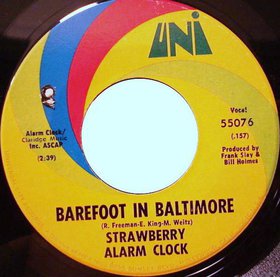by Michael Yockel (Baltimore Fishbowl, October 27, 2011)
 For an extended lysergic blink in the late 1960s, Top 40 radio turned day-glo, suffused by the sounds of psychedelic pop, which achieved its apocalyptic apogee in November 1967 when the Strawberry Alarm Clock’s “Incense and Peppermints” ascended to #1 on the Billboard singles chart. A psych-pop masterpiece — all buzzing guitar, churchy organ, an aggressively earnest lead vocal, and delightfully tongue-twisting trippy lyrics (“Good sense, innocence, cripplin’ mankind/Dead kings, many things I can’t define/Occasions, persuasions, clutter your mind/Incense and peppermints, the color of time”) — the song crystallizes the moment when pure counterculture psychedelia transmuted into mainstream masses’ manna.
For an extended lysergic blink in the late 1960s, Top 40 radio turned day-glo, suffused by the sounds of psychedelic pop, which achieved its apocalyptic apogee in November 1967 when the Strawberry Alarm Clock’s “Incense and Peppermints” ascended to #1 on the Billboard singles chart. A psych-pop masterpiece — all buzzing guitar, churchy organ, an aggressively earnest lead vocal, and delightfully tongue-twisting trippy lyrics (“Good sense, innocence, cripplin’ mankind/Dead kings, many things I can’t define/Occasions, persuasions, clutter your mind/Incense and peppermints, the color of time”) — the song crystallizes the moment when pure counterculture psychedelia transmuted into mainstream masses’ manna.
As ephemeral as any pop music genre, psychedelic pop quickly morphed, fractured, and, by 1970, disappeared entirely from the public consciousness. Ditto the Los Angeles-based Strawberry Alarm Clock — guitarists Ed King and Lee Freeman, keyboardist Mark Weitz, bassists George Bunnell and Gary Lovetro, drummer Randy Seol – although the band cranked out some memorable material in the immediate aftermath of “Incense and Peppermints,” notably the breezy “Tomorrow,” the hallucinogenic “Rainy Day Mushroom Pillow,” and, incongruously for an L.A. band, the jaunty “Barefoot in Baltimore.”
Released as the first single from the group’s third album, 1968’s The World in a Sea Shell, “Barefoot in Baltimore” saunters along agreeably, its soft-rock melody buoyed by Association-style vocals, chirpy xylophone, and chattering percussion. However, the song suffers from excruciatingly anemic lyrics, imagery seemingly gleaned from a cheery Chamber of Commerce brochure: “Laugh at sizzling sidewalks/Don’t step on the cracks/Old folks try to catch their breath/As children catch their jacks” and “Melted tar in crosswalks/Crab shells in the park/Pavement frying our poor toes/Until long after dark.”
“[The] soundtrack was great — the lyrics were horrible,” Mark Weitz, who wrote the song’s music with Ed King, explains in the liner notes to the re-released CD version of The World in a Sea Shell. “They were ‘sissy’ lyrics to us — ‘heel and toe with you’? We were pretty embarrassed to play that song on stage.”
Blame those tepid lyrics on non-band member Roy Freeman. George Bunnell, who, along with Weitz and Randy Seol, remains active in a recombinant Strawberry Alarm Clock, reports via e-mail that Freeman “was a comedy writer for [comedian/actor] Joey Bishop. No relation to Lee Freeman. He also penned the lyrics to [SAC’s] ‘Sit with the Guru’ and ‘Eulogy.’ Lee Freeman and Ed King wrote a song called ‘They Saw the Fat One Coming,’ which was in reference to Roy. He was actually a nice guy, but was forced upon us by the powers that be” (aka, the band’s record company).
“Barefoot in Baltimore” briefly dented the Billboard Top 100 in 1968, eventually stalling at #67 before evaporating altogether, although the song, not surprisingly, enjoyed considerable airplay in this area at the time. These days, it seldom, if ever, surfaces on radio – conventional, satellite, or Internet — but, via the miracle of YouTube, you can still experience the goofy charm of “Barefoot in Baltimore.”
Watch “Barefoot in Baltimore” (YouTube).

How did, I, BaltimoreBoy, NOT know about this. I’m ashamed.
Of course, the big question; why Baltimore? No one from the band is from Baltimore, right?
This song obscure or not recalls a simpler time and not to mention Heel and Toe walk…It was 50 years or so that this song came up for some reason and I was surprised it was by the SAC…I searched it out and it even sounded different and obscure…Its a good song and it has a memory. I can see why Baltimore would have it on…and the lights went out in Massachusetts…
Thanks for the story it recalls a memory of a peaceful time –well Vietnam was going to end in the future.
As Bethesda residents, day trips to Baltimore are easy and fairly frequent. For many years, it has been our family tradition to pop our SAC CD into our car player and sing along to “Barefoot in Baltimore” as we approach the Inner Harbor area.
I remember this song, but no one remembers it. I always sang ” heal and toe with you”, I thought those were cute lyrics. I like the song. Didn’t realize it was by SAC until I looked them up. Love the band.
It’s a breezy and incredibly upbeat song with great production values and wonderful vocals. I.e, a great and perfect pop song which I still listen to these days.
The group’s counter culture name – – –
(which Weitz explains in interviews was suggested by the first word in Beatles’ “Strawberry Fields” in compliance to what their record label requested in terms of imagery. The noun “Clock” was added by someone in the group simply motioning to the first object they noticed in the room at the time)
— – – – definitely hurt their credibility, (as did other silly rock group names like “Moby Grape” The Peanut Butter Conspiracy” and even “Grand Funk Railroad” – finally shortened to just ‘Grand Funk’)
But they were all solid musicians, and talented singer-songwriters, especially considering their young ages at the time. Now in my late 60s, I thank them all for contributing to that all too short period in time when the world went through a musical and mystical, creative zeitgeist before corporate rock took over.